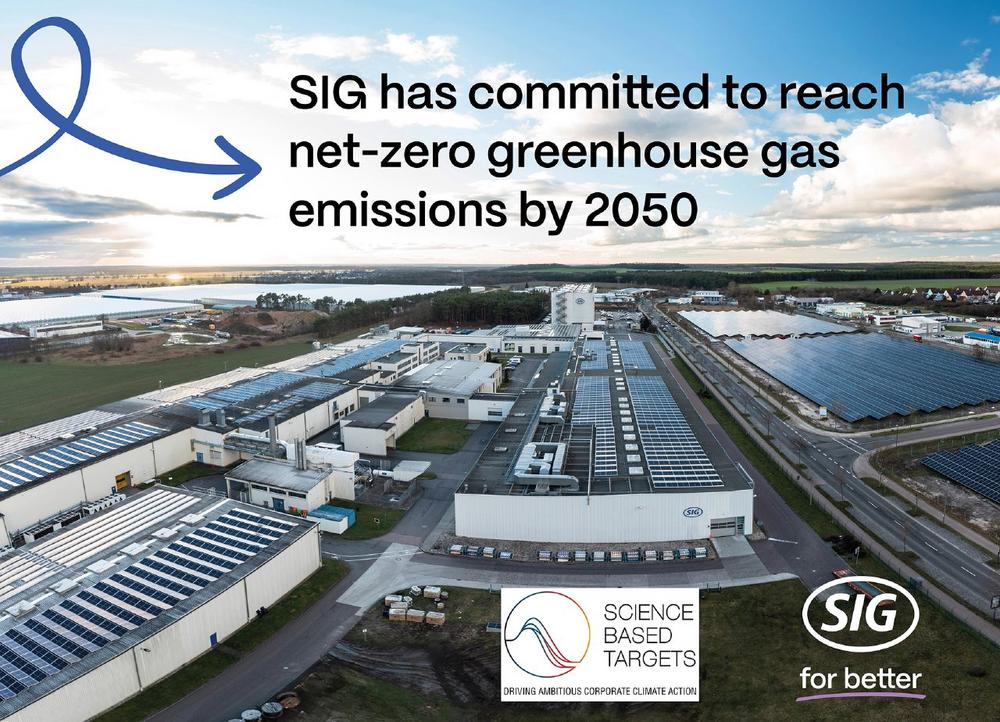SIG has set a new series of near and long-term science-based emissions reduction targets with the SBTi, committing to reach net-zero – the point at which a balance is achieved between emissions produced and emissions taken from the atmosphere – by 2050. These targets are significantly more ambitious than the company’s previous GHG reduction targets, approved by the SBTi in 2018 and 2020. The move sees SIG look beyond its own operations and commit to the decarbonization of its full value chain in line with climate science.
SIG’s new near-term 2030 commitments (using 2020 as the baseline year) include:
- 42% absolute reduction of scope 1 and 2 GHG emissions
- 100% renewable electricity through 2030
- 51.6% reduction of scope 3 GHG emissions per liter packed
SIG’s new long-term 2050 targets include:
- 90% absolute reduction of scope 1 and 2 GHG emissions
- 97% reduction of scope 3 GHG emissions per liter packed
Samuel Sigrist, CEO at SIG: “The approval of our Net-Zero pathway by the SBTi is a milestone achievement that showcases our dedication to decarbonizing our operations and value chain. Our new targets are considerably bolder than our previous GHG reduction targets and have been well received by our stakeholders. Decarbonizing our business will not be an easy task, but we’re excited to speed up our journey to net-zero as one of the first 325 companies that have received SBTi approval.”
Meeting the Paris Agreement goals and limiting global warming to 1.5°C requires net-zero carbon emissions globally by 2050. The SBTi’s rigid approval process helps ensure that SIG is using a robust, clear, and scientific framework to contribute to global efforts to mitigate climate change impacts.
The main ways SIG is reducing its operational emissions (scope 1 and 2) are its 100% renewable electricity commitment and outstanding on-site solar installation program, as well as exploring low carbon energy sources to lower direct emissions.
SIG’s products play a major role in reducing emissions across the value chain (scope 3), due to the amount and types of raw materials used. Going forward, the company’s priorities are to use less aluminum foil in its aseptic carton packs, work with suppliers to reduce emissions across the supply chain, further improve energy efficiency with new filling lines, and increase collection and recycling of used packaging.
SIG is a leading solutions provider of packaging for better – better for our customers, for consumers, and for the world. With our unique portfolio of aseptic carton, bag-in-box, and spouted pouch, we work in partnership with our customers to bring food and beverage products to consumers around the world in a safe, sustainable, and affordable way. Our technology and outstanding innovation capabilities enable us to provide our customers with end-to-end solutions for differentiated products, smarter factories, and connected packs, all to address the ever-changing needs of consumers. Sustainability is integral to our business, and we strive to create a net positive food packaging system.
Founded in 1853, SIG is headquartered in Neuhausen, Switzerland, and is listed on the SIX Swiss Exchange. The skills and experience of our approximately 9,000 employees worldwide enable us to respond quickly and effectively to the needs of our customers in over 100 countries. In 2022, SIG produced 49 billion packs and generated €3.1 billion in pro forma revenue (incl. unaudited revenue from recent acquisitions). SIG has an AA ESG rating by MSCI, a 13.4 (low risk) score by Sustainalytics, a Platinum CSR rating by EcoVadis, and is included in the FTSE4Good Index. For more information, visit our website.
For insights into trends that drive the food and beverage industry, visit the SIG blog
SIG Combibloc
Rurstraße 58
52441 Linnich
Telefon: +49 (2462) 79-0
Telefax: +49 (2462) 79-2519
http://www.sig.biz
Press Officer
Telefon: +49 (2462) 79-2608
Fax: +49 (2462) 7917-2608
E-Mail: heike.thevis@sig.biz
![]()

